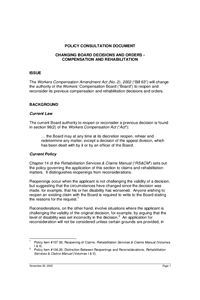Discussion Paper – Proposed New Policies to Implement the Workers Compensation Act (No. 2), 2002
The Legislature enacted the Workers Compensation Amendment Act (No. 2), 2002, ("Bill 63"). Expected to take effect in early 2003, Bill 63 created a new review and appeal structure for the workers' compensation system.
The primary change as a result of the new legislation was the reduction of the levels of review and appeal from three to two. Bill 63 would also create:
- an internal review function at the Workers' Compensation Board ("Board") called the Review Division to review initial decisions by Board officers; and
- the Workers' Compensation Appeal Tribunal ("WCAT"), an independent appeal tribunal external to the Board, as the final level of appeal on most issues.
Other changes included the following:
- limitations would be placed upon the Board's currently open-ended reconsideration authority;
- policy would be made binding throughout the workers' compensation system; and
- changes would be made to the process for levying administrative penalties for health and safety violations under Part 3 of the Workers Compensation Act ("Act").
The Policy and Regulation Development Bureau ("Policy Bureau") recognizes that matters relating to the rules, practices and procedures of WCAT are for the WCAT chair to determine and that it would be inappropriate for the Policy Bureau to develop policies in this regard.
With respect to internal review, the Board created a review body called the Review Division. The Act provided that, subject to the Board's practices and procedures, a review officer would conduct a review as the review officer considered appropriate to the nature and circumstances of the individual decision or order being reviewed. These practices and procedures were being developed by the Review Division under the direction of the President and were to be made publicly available. There would, therefore, be no policy developed for the Review Division, at least at the beginning of the internal review process. Should it become necessary at a later point to develop policies on particular issues related to the Review Division, further consideration would be given at that time.
Policy would, however, be developed in the following two areas so that Bill 63 could be implemented in the intended manner:
- how Board decisions and orders may be changed (reopenings, reconsiderations, varying and cancelling and setting aside decisions for fraud and misrepresentation); and
- how applicable "policy" is binding on the Board.
Further information about policy development in these areas is set out in the attached Policy Overviews. The overviews were to result in amendments to the Rehabilitation Services & Claims Manual (Volumes I & II), the Assessment Policy Manual, the Prevention Manual and the Prevention Division Policy and Procedure Manual.
In addition, a significant number of consequential changes to the Board's policy manuals were required. This would include removing policy in relation to the process for levying administrative penalties to reflect the statutory changes and to reflect the creation of the Review Division.
The Policy Bureau consulted until December 11, 2002.

